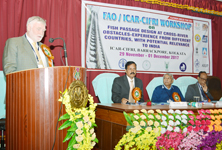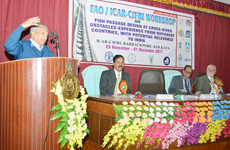The FAO/ICAR-CIFRI workshop on “Fish passage design at cross-river obstacles – experience from different countries, with potential relevance to India”, is being organised at ICAR-Central Inland Fisheries Research Institute, Kolkata from 29th November 2017 – 1st December 2017.


This workshop encompasses diverse aspects related to fish passes, viz., the current scenario of fish pass facilities around the globe, status of fish pass in India, behaviour of migratory fish species, fish pass design and efficacy of fish pass. The workshop brings together a multidisciplinary panel of experts working at different international organizations such as the Food and Agriculture Organization of the United Nations (FAO, Rome), Hydraulic Engineering and Environment (Germany) and the University of Natural Resources and Life Sciences (Austria).
Dr.Dilip Kumar, Former Director and Vice-Chancellor, ICAR-Central Institute of Fisheries Education, Mumbai in his address said fish pass design is one of the areas where FAO experience will immensely helpful in proper designing and construction of fish pass during the construction of new dams. Dr Kumar emphasised that collaboration and working in partnership between various departments of governments is highly required for successful working of fish passages.
Dr. B. K. Das, Director ICAR-CIFRI emphasized that fish passes are of increasing importance for the restoration of free passage for fish and other aquatic species in rivers as such devices are often the only way to make it possible for aquatic fauna to pass obstacles that block their up-river journey. The fish passes thus become key elements for the ecological improvement of running waters, he added.
Dr.GerdMarmulla, Fishery Resource Officer, Food and Agricultural Organisation in his address said that India is one of the biodiversity rich country having more than 900 freshwater fish species. One of the most important among them is Hilsa. Long distance migration is lifeline of many fish species for their physiological requirement like spawning, breeding, seasonal habitat change and related activities. Dams hampers free migration of migratory fish species andstocking alone is not a viable option as it does not replace natural reproduction of fish in long term.
Dr. B. P. Das, Former Engineer-in-Chief of Government of Odisha, FAO expert Consultant said during 1960-90s emphasis was on providing irrigation, power from multi-purpose dam projects. In 80s, after the decline of fisheries in Missouri and other rivers in US, the concept of fish passage and fish canals for lateral migration of fish initiated. Fish canal as fish passage enables fish migration in rivers.
The participants of the workshop represents several PSUs including NHPC, SJVNL, ARUP, officials from State Water Resource Department, Gujarat, Central Water Commision, Ministry of Water Resources (MoWR) and Ministry of Environment, Forest and Climate Change (MoEFCC).
(Source: ICAR-Central Inland Fisheries Research Institute, Barrackpore)








Like on Facebook
Subscribe on Youtube
Follow on X X
Like on instagram